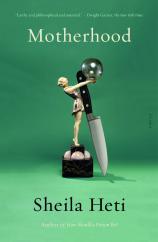Motherhood
Review
Motherhood
Over the past decade and a half or so, it’s become acceptable (if not downright fashionable) for women to write articles, essays, stories and novels about their ambivalence toward their own children and to the daily drudgeries and indignations of motherhood. In her new novel, Sheila Heti takes things one step further, providing a book-length meditation or internal debate of sorts about whether or not to bear children --- and to whom women owe that choice.
Even though MOTHERHOOD is cataloged as a work of fiction and its subtitle is “a novel,” it’s awfully tempting to read it as autobiography. It’s illustrated with black and white photographs, presumably of Heti’s own home and family, and certainly the protagonist’s biography bears a lot in common with Heti’s own --- she’s a writer in her late 30s, living in Toronto. Readers may find themselves deliberately attempting to define this unnamed narrator apart from the author, or they may simply give in and conflate the two.
"Some readers may implore Heti’s narrator to decide already, while others may immerse themselves in the vital questions she raises --- questions that shatter many of the assumptions we (still) make about the true value and purpose of women’s lives."
The book’s structure and style, more than anything, are what make it identifiable as a novel rather than a book-length essay. Heti organizes many of the sections as a series of yes-or-no questions, which the narrator answers --- using a technique inspired by the I Ching --- by flipping coins to reveal a prophetic answer. This seemingly capricious technique actually serves to draw the narrator deeper into self-critique and self-examination, even when the coin’s “answers” are contradictory or absurd. As the narrator notes, “When I get an answer I didn’t expect, I have to push myself to find another answer --- hopefully a better one. It’s an interruption of my complacency --- or at least that’s what it feels like, to have to dig a little deeper, to be thrown off.” The novel’s structure also mirrors a woman’s reproductive life, with several sections labeled “Follicular,” “Ovulation” and “Bleeding,” the tone of which reflects the rising and falling moods of the narrator’s cycle and her constantly shifting outlook on her potential motherhood.
Complicating the narrator’s decision is her identity as a writer, someone who already has done her fair share of creating and who fears that giving birth to a child will hamper other kinds of artistic creativity. On the other hand, the narrator feels a sense of guilt about the prospective decision not to bear a child, not only because of the expectations of society at large but also because of her family history. Her grandmother narrowly escaped the concentration camps, so who is this narrator to turn her back on the prospect of perpetuating the next generation?
The narrator’s inner dialogue returns repeatedly to the Old Testament story of Jacob wrestling with the angel. At times, that’s what reading MOTHERHOOD can feel like --- a high-stakes wrestling match with profound consequences. Some readers may implore Heti’s narrator to decide already, while others may immerse themselves in the vital questions she raises --- questions that shatter many of the assumptions we (still) make about the true value and purpose of women’s lives.
Reviewed by Norah Piehl on May 11, 2018
Motherhood
- Publication Date: May 7, 2019
- Genres: Fiction, Women's Fiction
- Paperback: 304 pages
- Publisher: Picador
- ISBN-10: 1250214785
- ISBN-13: 9781250214782




